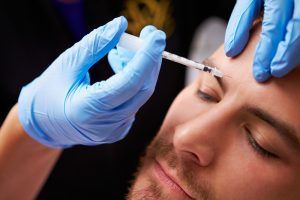Sweating while nervous is not abnormal, but some people sweat enough that it begins to seriously impact their mental health and social lives. (Learn More — Nervous Sweating)
When people who sweat excessively tend to do so when nervous, it is called nervous sweating.
Nervous sweating is usually a result of hyperhidrosis, which is sweating excessively either due to triggers (secondary hyperhidrosis) or for no known reason (primary hyperhidrosis). (Learn More — Types of Nervous Sweating)
As with most conditions, treatment for nervous sweating should be the mildest one available that still solves the patient’s issue. Often, therapy can reduce or even eliminate the need for medication or surgery.
If therapy alone doesn’t address the condition, there are several medications that can help a patient. Surgery can sometimes help, although its application is limited. (Learn More — Treatment for Nervous Sweating)
When you and your doctor consider your options, remember to balance the increase in quality of life a treatment can bring with the risks of the medication or procedure. This is why therapy can be an important element. If you can gain moderate control of your nervous sweating and learn to feel confident and live life more fully, you may not need to try riskier treatments. (Learn More — Safety vs. Quality of Life)
Nervous Sweating
Sweating to some degree when exercising in a hot environment, or when under stress or pressure is a normal part of life. However, for some people, sweating becomes a significant and embarrassing problem.
According to a relatively small survey done by Men’s Health, 73 percent of men wish they would sweat less. It’s also been shown that many men who are faced with even just mildly difficult addition, subtraction, or similar math problems begin to sweat from the pressure.
While everyone sweats, and the problem is not unique to men (although men tend to sweat more), some people deal with what is called nervous sweating to such a degree that it begins to interfere with their lives. These individuals, fearing embarrassment or ostracization, may avoid many social situations rather than risk their sweating drawing attention.
Types of Nervous Sweating
Nervous sweating and the avoidance behaviors associated with it can generally be linked to one form of hyperhidrosis, which is when the body sweats excessively.
- Primary hyperhidrosis: With primary hyperhidrosis, a person sweats excessively with no known trigger.
- Secondary hyperhidrosis: With secondary hyperhidrosis, one sweats excessively only on certain cues, one of which can be anxiety. This can unfortunately lead to an embarrassing cycle of worrying about your sweating, getting more anxious about it, and thus beginning to sweat more.
Either form of hyperhidrosis can lead to further anxiety and avoidance problems. Those without such a condition can develop a social phobia around sweating, even if they do not actually sweat much more than average.
If you struggle with sweating enough that it impacts your life, especially your social life, you likely have hyperhidrosis. This is a diagnosable condition, and you should see a doctor to confirm it is what you have. Other medical conditions can also cause sweating problems.
Hyperhidrosis can affect only certain areas of your body (focal hyperhidrosis), or it may generally affect everywhere you tend to sweat (generalized hyperhidrosis). People tend to sweat most on their feet, groin, armpits, and hands due to the relatively high concentration of sweat glands in these areas.
If a doctor tells you that your level of sweat is normal, but you still feel anxious about your sweating, do not get discouraged. You can see a mental health therapist to learn how to manage your anxieties and live a fuller life.
Treatment for Nervous Sweating
Once your doctor determines your sweating is not caused by any serious condition, they can help you find the best way to reduce your sweating problem. If your excessive sweating is related to another medical issue, that underlying issue must be treated.
One of the safest ways to reduce nervous sweating is through therapy. If you suffer from secondary hyperhidrosis, with symptoms triggered by specific things like anxiety, talking to a counselor can help you learn strategies to control your anxiety better. In some cases, you may even need little or no medication to gain satisfactory control of your problem.

If your sweating is causing you to have panic attacks or avoid many social situations, therapy is a good idea even if it is also determined you need medication or surgery. That level of stress can be a major detriment in life. It may not completely go away even if you get to a place where you are sweating at a normal rate. You’ll benefit greatly from learning stress management techniques in therapy.
These medications can treat hyperhidrosis:
- Prescription antiperspirant (Drysol, Xerac AC): Antiperspirant is a common over-the-counter product, but prescription antiperspirant works differently. It is applied to the affected skin at night and washed off in the morning. It helps to control odor and reduce sweating.
It can be an irritant to the skin and eyes. Only use it as instructed, and alert your doctor if it causes any rashes or burning. - Prescription cream: Proven to be effective at treating hyperhidrosis on the face and head, the medicine glycopyrrolate is sometimes prescribed to people dealing with hyperhidrosis. Usually a 2 percent solution is used.
While generally safe when used as prescribed, it has been linked to headaches in a small portion of users in at least one study. - Anticholinergic/nerve-blocking drugs (Ditropan XL, Oxytrol): Some people can benefit from medications that block certain signals from being sent in their body, which can reduce sweating. Anticholinergics can take two weeks to take full effect.
Possible side effects include changes to bladder control, dry mouth, and blurred vision.
- Botulinum toxin injections (Botox): Botulinum toxin —much more commonly known as Botox — can temporarily block the mechanisms that cause sweating in treated areas. An affected area is iced, anesthetized, and then injected (generally several times per area). This can relieve symptoms for about six months to a year.
The treatment can be painful. It can sometimes temporarily causes muscle weakness. If your symptoms seem severe, contact a doctor immediately.
In fairly specific cases, surgery may be considered to treat sweating, although this is relatively rare. These surgeries are sometimes used to help with hyperhidrosis:
- Microwave therapy: This is a type of therapy that targets sweat glands with microwave energy, slowly destroying them via treatments that take about 20 to 30 minutes. Treatments are spaced out over a few months.
This type of treatment is not widely available. It can cause discomfort in the affected area. - Sweat gland removal: Possible via a number of methods and generally only done to the armpits, this type of surgery involves removing the sweat glands in that area.
- Nerve surgery: Through clamping, burning, or cutting specific spinal nerves, a surgeon can stop you from sweating in certain areas. This sometimes leads to what is called compensatory sweating, where you may begin to sweat elsewhere.
It is not possible for isolated neck or head sweating.
Safety vs. Quality of Life
When treating nervous sweating, unnecessary risks should be avoided. Even if you still sweat moderately more than most people, it may be better not to push for more serious treatment if they involve potentially painful or risky outcomes. Quality of life is an important part of medicine.
This is why therapy is a good idea when dealing with nervous sweating. It can help you improve your self-confidence, control your anxiety, and has no real risks. It may be possible to live a full and happy life even without complete symptom control.
References
Hyperhidrosis: Symptoms & Causes. (October 2017). Mayo Foundation for Medical Education and Research (MFMER).
Hyperhidrosis: Diagnosis & Treatment. (October 2017). Mayo Foundation for Medical Education and Research (MFMER).
Overcome Nervous Sweating & Hyperhidrosis. (August 2019). Anxiety Coach.
Stress and Sweat: 10 Tips to Stay Cool Under Fire. (November 2017). WebMD.
Put an End to Nervous Sweating. (July 10, 2015). Men’s Health.
Topical Glycopyrrolate for Patients with Facial Hyperhidrosis. (May 2008). British Journal of Dermatology.
Oral Medications. International Hyperhidrosis Society.
What Is Hyperhidrosis? (December 2017). Medical News Today.



